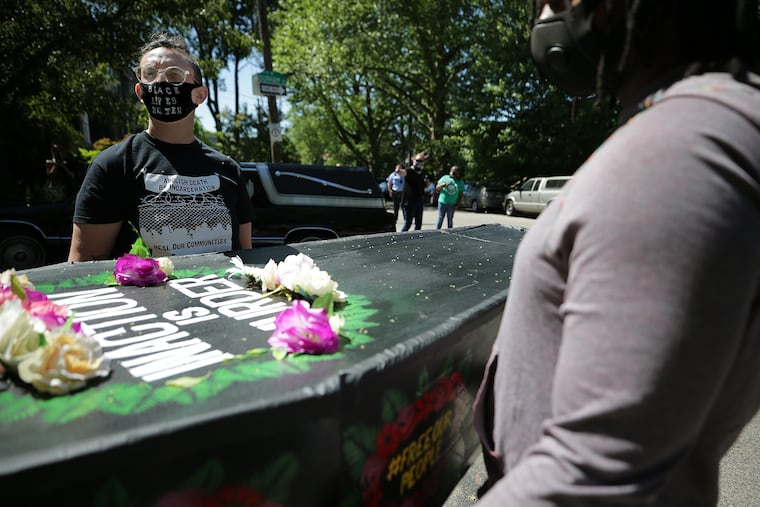Outside a Philly official’s home, protesters call for better housing options for the homeless and disabled
Protesters drove a hearse to the home of Liz Hersh and laid out three cardboard coffins on the sidewalk to symbolize the deaths of people in shelters and nursing homes.

Saying the city must do more to protect the homeless and disabled from COVID-19, protesters staged a funeral procession outside the Mount Airy home of Office of Homeless Services director Liz Hersh on Sunday morning.
Organized by the Philadelphia chapters of ACT UP and Disabled in Action/ADAPT, which advocate for people with HIV/AIDS and disabilities, respectively, protesters drove a hearse to Hersh’s home and laid out three cardboard coffins on the sidewalk to symbolize the deaths of people in shelters and nursing homes. A handful of police officers watched at a distance.
Protesters said that they have met with Hersh and other city officials about their concerns — that homeless people living in shelters are particularly vulnerable to COVID-19 because of the close living quarters — and that the city has made progress in moving people out of shelters. City officials said they’re scheduled to meet with the group soon.
But, protesters said Sunday, more needs to be done. In a news release, they called for the city to open 600 more permanent supportive housing units, and 6,000 new units of affordable housing for people who make less than $20,000 a year. And at Hersh’s house on Sunday, protesters called for city officials to house people returning from prison, as well as people with disabilities who are living in nursing homes while they wait for their own residences to be renovated to accommodate their disabilities.
Protesters said they know of seven people who have died of the coronavirus who were either in a city shelter or disabled and in a nursing home.
“The most pressing short-term issue that needs to be addressed is that there are still barriers for people with disabilities to get into housing if they’re vulnerable to COVID and in a shelter or nursing home and don’t feel safe,” said Max Ray-Riek, a member of ACT UP.
City spokesperson Mike Dunn wrote in an email that one person in the shelter system had died from COVID, and said that of the 1,278 COVID deaths in the city to date, 53% were among residents of long-term-care facilities.
Dunn added that 250 people have been housed in the city’s quarantine site for coronavirus patients with nowhere else to go, and that an additional 50 people who are at risk of contracting the virus are being housed in a separate facility. Shelters have also put social-distancing practices into measure, he wrote.
“As we have previously said, should we need additional space, we will lease additional sites to meet the need," he wrote. "Despite broadening the criteria for entrance into these sites, the sites are not at capacity.”
On Sunday, protesters also decried the revised city budget, which, in an effort to make up funding lost during the pandemic, slashes funds to a number of city services, including affordable-housing services and eviction prevention, but increased funding to police.
“There’s money for the police and no money to house people,” said ACT UP member José DeMarco.
It was a sentiment that took on particular significance the morning after large protests in Center City against police brutality were followed by looting, fires, a city curfew, and a police crackdown.
“Don’t push us to the side. Don’t tell us we have to keep waiting,” said Jamaal Henderson, of ACT UP and the Pennsylvania Poor People’s Campaign. “Don’t try to diminish what’s going on. We are peaceful now. But as we saw yesterday, I don’t know how much longer that’s going to last. We need to start making and passing policies that are equitable and fair.”
As protesters spoke, some of Hersh’s neighbors came out to the street and told them to stop. “You guys are picking on the wrong person. She’s a good person!” one man shouted. Another neighbor, Sara Steele, said that Hersh has worked on housing equity “her entire career” and that protesters were making a “tactical error” by targeting her. “It’s really easy to target one person than this much larger system,” she said.
Henderson said that protesters were calling for systemic reform, and want Hersh to advocate for change to her bosses in city government. He spoke with neighbors for some time about the protest. “The best thing we can do to combat ignorance is to impart knowledge,” he said afterward.